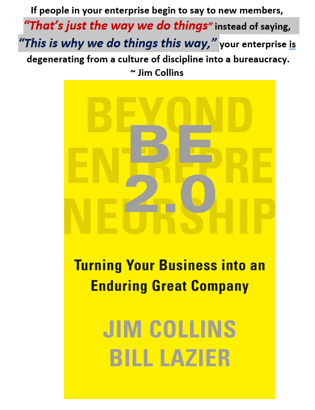 What’s your culture like?
What’s your culture like?
Is it a culture of discipline?
How would you know?
In BE 2.0 (Beyond Entrepreneurship 2.0) Jim Collins offers insight.
When you hire and begin orientating a new team member, what’s said to them as they learn to follow your systems and procedures?
Is it:
“That’s just the way we do things.”
Or
“This is why we do things this way.”
If people in your enterprise say, “That’s just the way we do things” instead of saying, “This is why we do things this way,” your enterprise is degenerating from a culture of discipline into a bureaucracy.
A CULTURE OF DISCIPLINE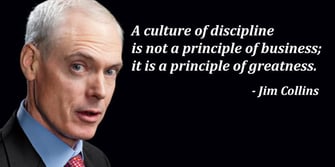
When I send an email my signature shares this quote from Good to Great:
“A culture of discipline is not a principle of business; it is a principle of greatness.”
-Jim Collins, author of Good to Great
Anywhere you find greatness, especially in business, you find a culture of Discipline.
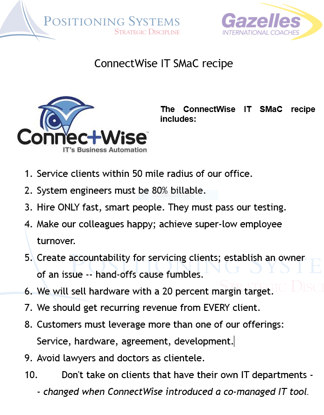 SMAC Recipes
SMAC Recipes
In October of last year, we asked, SMaC - Still Relevant in 2020?
Few businesses develop their SMaC recipe. I believe most companies have a specific, methodical, and consistent way of doing business. They just haven’t identified and documented these practices.
If you’re not setting aside time to specifically identify what you do specifically, methodically, and consistently different than the next idea, After-Action Reviews, are probably not something you’re going to do either.
After-Action Reviews
My oldest son and I are military history buffs. We both read a lot of books, he’s a mechanical engineer and he grew up loving battleships. Dan even worked for a Naval contractor in DC designing ships. We both love to study World War II, particularly the Naval engagements.
Dan shared one of the reasons the US Navy, despite their early failures in WWII, turned the war in the USA’s favor was due to how quickly they learned from their failures. After the battle of Coral Sea, losing the Aircraft Carrier Lexington and almost Yorktown, the Navy figured out how to pressurize their fuel pipes with CO2 rather than fuel anytime they weren’t actively fueling aircraft. They didn’t have that system until Midway. Had they not had it, they would have not been able to control ship fires.
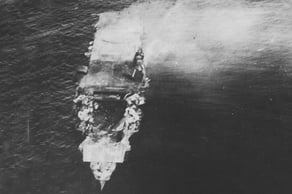
Despite losing Yorktown, had they not gotten the fires out during the first Japanese attack, the Japanese planes would have been able to attack the other carriers, possibly changing the outcome of the battle. The Japanese fire control systems, on the other hand, resulted in the loss of their 4 carriers, dramatically changing the war from this point on.
Collins learned this idea for After-Action Reviews from the military, and it's something he adapted for his own business.
Here’s how Collins explains what an After-Action Review is, “The idea is to set aside time after every mission to discuss, review, and learn from what happened. What worked? What did we learn that can be applied to future missions? What didn’t work? What did we fail to prepare for? And then integrate the learning from the AAR directly into preparing for what comes next. Done systematically, AARs become part of the training regimen, part of continually developing and refining the SMaC recipes that work best. We’ve adopted the AAR model at The Good to Great Project. We do not close out an engagement and call it done until we have had a team AAR, captured the learnings, and integrated any adjustments into our SMaC recipes.”
After-Action Review Question
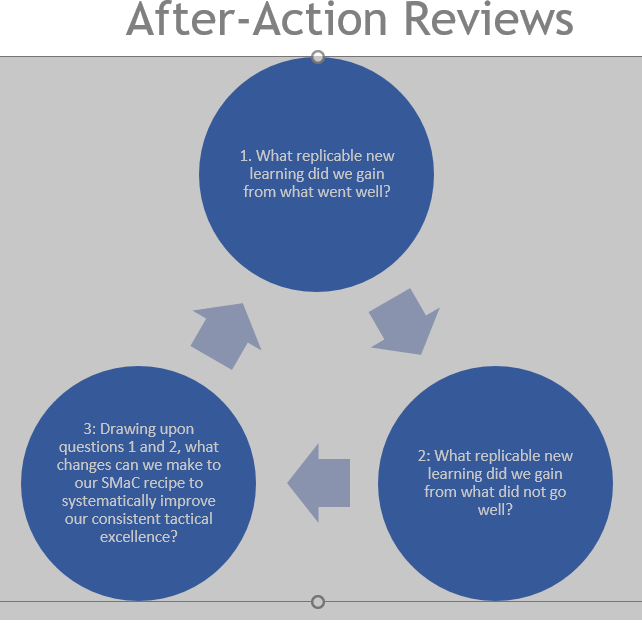 1: What replicable new learning did we gain from what went well?
1: What replicable new learning did we gain from what went well?
2: What replicable new learning did we gain from what did not go well?
3: Drawing upon questions 1 and 2, what changes can we make to our SMaC recipe to systematically improve our consistent tactical excellence?
When do you use this? Whenever you have an important event, where your business might be required to do again. Whenever you feel you want and need to gain insight you can apply it to improve your business model.
As a sales manager, I would ask these questions to review a sales call with my salespeople to improve their performance
Most businesses are on to the next project or event before this event is even finished. They fail to yield the important knowledge and experience to improve from what they’ve learned.
Thankfully, the US Navy After-Action Review discipline turned failures into successes.
To create an environment where everyone is inspired to give their best, contact us today to schedule a free exploratory meeting.
Growth demands Strategic Discipline.
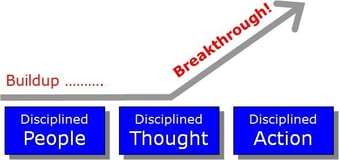 Building an enduring great organization requires disciplined people, disciplined thought, disciplined action, superior results, producing a distinctive impact in the world.
Building an enduring great organization requires disciplined people, disciplined thought, disciplined action, superior results, producing a distinctive impact in the world.
Discipline sustains momentum, over a long period of time, laying the foundations for lasting endurance.
-1.jpg?width=267&name=3%20Disciplines%20of%20Execution%20(Strategic%20Discipline)-1.jpg) A winning habit starts with 3 Strategic Disciplines: Priority, Metrics, and Meeting Rhythms. Forecasting, accountability, individual, and team performance improve dramatically.
A winning habit starts with 3 Strategic Disciplines: Priority, Metrics, and Meeting Rhythms. Forecasting, accountability, individual, and team performance improve dramatically.
Meeting Rhythms achieve a disciplined focus on performance metrics to drive growth.
Let Positioning Systems help your business achieve these outcomes on the Four most Important Decisions your business faces:
|
DECISION |
RESULT/OUTCOME |
|
PEOPLE |
|
|
STRATEGY |
|
|
EXECUTION |
|
|
CASH |
|
Positioning Systems helps mid-sized ($5M - $250M) business Scale-UP. We align your business to focus on Your One Thing! Contact dwick@positioningsystems.com to Scale Up your business! Take our Four Decisions Needs Assessment to discover how your business measures against other Scaled Up companies. We’ll contact you.
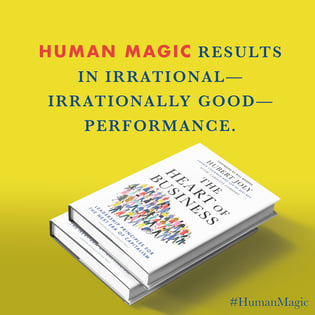 NEXT BLOG – “Work is Love Made Visible.”
NEXT BLOG – “Work is Love Made Visible.”
In 2012 Best Buy was on life support. Hubert Joly was offered the position to be the next CEO. Despite his colleagues and friend’s discouragement, Jolly went on to orchestrate one of the most spectacular retailer turnarounds in history. Learn how Joly’s philosophy, “Work is Love Made Visible” led the transformation of Best Buy, next blog.






.jpeg?width=150&height=135&name=Hand%20with%20marker%20writing%20the%20question%20Whats%20Next_%20(1).jpeg)

